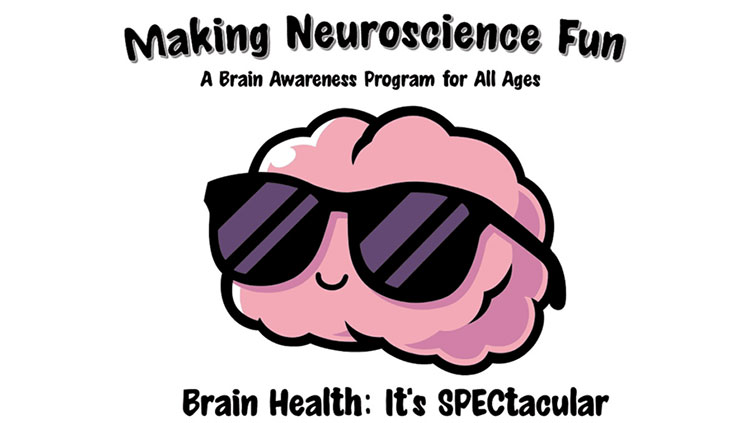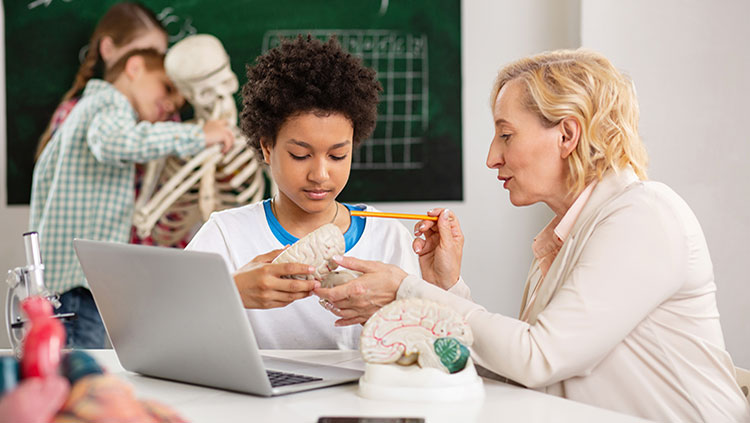Brain Health: It’s SPECtacular (Ep. 3) — How Social Health Builds the Brain
- Published18 Jul 2025
- Source BrainFacts/SfN
What is social health, and why is it crucial for brain development? In this video, Linda Gorman, neuroscientist and Founder of Making Neuroscience Fun, LLC, explores how our relationships, sense of self, and social environment shape the brain's ability to change — especially during childhood and adolescence.
Through the lens of the “Brain Health: It’s SPECtacular” program, Gorman explains how social behaviors like empathy, self-esteem, and connection are essential tools for brain development, supporting adaptability and lifelong wellness. Designed for educators, parents, and caregivers, this video shows how fostering social health among young learners helps lay the groundwork for a resilient, healthy brain.
Check out other videos in the six-part video series:
- Episode 1: Teaching Social, Physical, Emotional, and Cognitive (SPEC) Skills
- Episode 2: How Social Health Builds the Brain
- Episode 4: Why Emotional Health Matters for a Growing Brain
- Episode 5: Attention, Learning, and Memory Shape Growing Minds
- Episode 6: Teaching Brain Health in Schools and Communities
Explore Making Neuroscience Fun — Brain Health: It’s SPECtacular from Johns Hopkins
CONTENT PROVIDED BY
BrainFacts/SfN
Transcript
Dr. Linda Gorman:
We're now going to talk about social health. And what is social health? And again, a lot of the school systems now are using the socio-emotional materials that are out there, so you know something about social health. But a lot of people don't, and a lot of people don't understand how social health affects your ability — your brain's ability — to change, which affects your ability to change your behaviors so that you can adapt to situations.
So basically, humans are social animals. We need other people. We need social behaviors in order to survive. So basically, the tools — our social health — is going to provide us with the tools so that we can develop coping mechanisms. And those tools are going to include some personal attributes like your sense of self, theory of mind, your self-esteem. It's going to include your social environment. You have to — we're a social animal. We live in a social environment, and our social environment always changes. So, we need to be able to adapt to that social environment. And then, developing support systems. And again, those support systems, just like everything else, need to change.
So when we look at the brain — and again, I'm going to show you the brain just because I love brains and it makes me happy to see them — but there are parts of your brain that basically develop into these social networks so that you can perform those social behaviors. You have your self-esteem. You know who you are based on other people. And this allows you to understand, recognize, and interpret social cues of others.
Since we're a social animal, we have to be able to understand what others are doing in our social environment. And basically, starting from birth all the way to when kids are 9 or 10, these behaviors — these social behaviors — are developing. Now, one of the things that we have to understand is that until those brain areas are developed, we don't necessarily — we're not able to perform those social behaviors that we have. So, we have to wait till the brain develops.
And basically, these areas of the brain — there's lots of neuroplasticity going on. The networks are forming and changing all the time. As you get older, these social networks — even though they're fully developed — they're changing all the time. That's one of the things that I love about the nervous system — it's constantly changing. That's something that a lot of people don't like about the nervous system, because they can't know exactly what's going on in the nervous system.
But basically, during adolescence, we know that's when hormones are playing a role and it's changing. So, you get the development. One of my favorite videos that I used to show was a newborn — literally popped out — and the dad's holding the baby, and the dad is making faces at the baby with its tongue. And the baby, who doesn't even know it has a face or a tongue, is watching and imitating. So, we know that humans imitate other behaviors.
So this is something that we know — need to realize — is that kids will imitate other behaviors. You know, that sense of self has to do with them understanding. And you know that little ones — they're very egocentric — but then they grow out of that because the theory of mind comes in, where they start to understand that other people have different ways of seeing the world, have different perceptions of the world.
All of these things — this has to be developed. And this develops during the elementary school ages. And it continues through adolescence, which, as I said, adolescence goes anywhere from middle school through high school through college. My college kids used to hate it when I say they were still adolescents. But again, anytime you have hormones that are affecting your development of your brain, that's adolescence. And that can go— because again, there's no— we've sort of got ballparks on when these developments occur — and this can go anywhere from mid-20s to early 30s.
So again, the social brain — we know that there are areas high in neuroplasticity. So, if we look at our social behaviors and we look at the tools that we're able to do — so again, we know that these behaviors are changing. And how can we enhance our social behaviors?
Well, basically: get to know yourself as well as others. Be nice to yourself as well as others. When you're nice to yourself, it's easier to be nice to other people. Nice to other people but not nice to yourself — then that's not good for your social brain. Take care of yourself and others. Put in the time and energy to build relationships. And again, relationships are hard to build, change during your entire life. So you need to focus on these things.
Know when to change your coping mechanisms, and know when to ask for help. I can't tell you how many students that I've advised that — they're so afraid to ask for help because it makes them feel like their sense of self is lower because of that. No. Your sense of self is going to be better, your self-esteem is going to be better, and then you want to strive to be the person that you want to be.
One of our stories is about social media. And one of the things that we know — and we know this because of research that's been done — is that when someone portrays themself as something different on social media than they actually are, they're hurting their social parts of their brain. And by hurting it, I mean that they're compromising those neuroplastic mechanisms so that their brain isn't able to change, and it's detrimental to them.
So all of these things are going to increase neuroplasticity, and increase the neuroplasticity in those parts of the brain that are controlling your behaviors.
So again, when we look at how to have a healthy brain, our social health is going to provide us with the tools. If we have a good sense of self, good self-esteem, we have a good support system, our brain is going to be healthy. And that's what we want to do.
Now again, social health isn't the only thing. You want to also have good physical health, emotional health, and cognitive health. So, we'll move on to the next section.
Also In Teaching Techniques
Trending
Popular articles on BrainFacts.org













